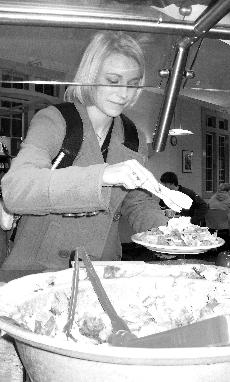Wholesome nutrition should be steady part of female diet

November 14, 2007
Everyone on the campus loves chicken nugget day at the Grill. When you see the mountain of nuggets sitting next to a mountain of French fries at the buffet line, all you want to do is devour it all with a nice-sized bowl of barbeque sauce. But, I bet you’re not wondering how many calories you’re taking in or how healthy the meal is for you and your body.
As women, there are many health risks and issues that we must begin thinking about today so they don’t affect us tomorrow. The leading killer among women is not breast cancer, but in fact, it is heart disease. Osteoporosis is a leading health concern among older women and for African American women, diabetes is a genetic struggle.
While we enjoy eating chicken nuggets on Thursday and Midnight Breakfast on Friday, we need to really be thinking about the food choices we make for the remaining days of the week.
Rita Audlehelm, director of health services, has been at Simpson since August. She is new to working with a younger generation, but feels that young women should really pay close attention to how they eat and how often they exercise.
“For young women, they need to concentrate on getting good, wholesome nutrition,” Audlehelm said. “The hardest thing is to continue that [healthy eating] when you are away from home for the first time and you have the freedom to choose and eat anything you want.”
In a pamphlet put out by the American College Health Association called “Eating 101: The Basics of Good Nutrition,” it states the importance to really try to remember the basic food groups and follow them every day. This way, the health of our generation will be greater than generations before us.
It is important to also eat in moderation and exercise at least three-to-four times a week. It is also important to plan out a diet that works and fits your body.
The media is always telling us about different diets where we can shed pounds easily and still eat the foods we love. But what most do not know about those diets is that they do not have long-term results and can harm our bodies more than actually help them. The U.S. Department of Agriculture has put out a program called “My Pyramid” where people can connect to the Web site (www.mypyramid.gov) and personalize their own diets and exercise routines.
Junior Trish McCusker found that she put on a few pounds after coming to college in the fall of 2006. In high school, she was enrolled in a strength and conditioning class at her high school and later found that college life was very stressful. Now that she is older, she feels that being healthy is more important than how much a person weighs.
“I try to work out five times a week,” McCusker said. “It’s easier to have a routine where it only takes an hour and I can work my schedule around it.”
McCusker, who feels uncomfortable working out on campus, goes to Anytime Fitness where she pays a $40 per month for her membership. There, she feels more comfortable to work out and she loves the variety of equipment available as well as the flexible hours.
As for food and nutrition, McCusker eats smaller meals throughout the day and sometimes substitutes a meal with a protein bar.
“Eating smaller meals keeps my energy level up instead of having it go up and down throughout the day,” McCusker said.
McCusker also mentions that she does have a guilty pleasure of chocolate, but she really tries to moderate what she eats and still enjoys the foods she loves.
As for exercise, Audlehelm feels that women should continue to do weight bearing exercise where they are on their feet and moving.
“The biggest switch for most young women is that the majority of them have probably participated in some athletic activity or they had regular physical education in high school,” said Audlehelm. “They come to college and, for the first time, they are not doing either one of those.”
Audlehelm also mentioned that a young woman’s metabolism slows down when they are not as active and thus, weight is gained when eating habits are the same.
She also says that women should consider putting more dairy into their daily diets. Audlehelm has found that many young women do not like to drink milk, which can really hurt them in the long run. She strongly urges young women to have a intake of two-to-three servings of dairy products every day.
It is very important to think about your body and take care of it. Every woman has things about their bodies they wish they could change. Keeping up with a healthy diet, exercising regularly and monitoring stress will help us lead long and healthy lives. If anything, take the following and apply it to your every day life:
1. Remember the basics: try to have a daily balance of good, nutritious foods
2. Exercise: on average, a woman should exercise three to four times a week, try to work it into your schedule
3. Drink water: everyone should drink eight glasses a water per day to stay healthy and hydrated
4. Portion: remember, smaller portions are better for you and help monitor how much you eat
5. MyPyramid.gov: go to this website and personalize your very own diet and exercise routine that does not interfere with your everyday life.











